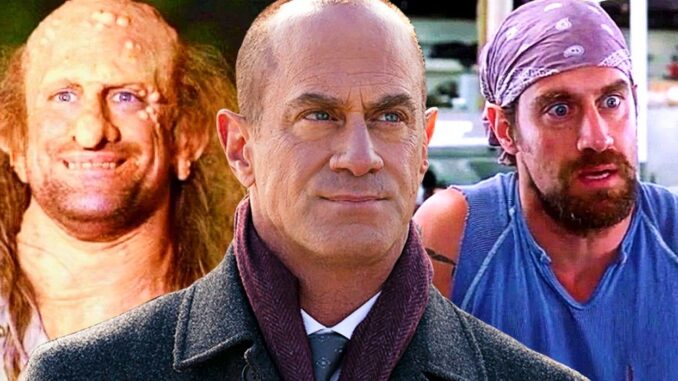
The Boomerang and the Badge: Christopher Meloni's Odyssey with Elliot Stabler
The television landscape is littered with iconic characters and beloved actors, but few possess the indelible imprint of Detective Elliot Stabler, brought to visceral life by Christopher Meloni. For twelve seasons, Meloni was the unwavering, often tempestuous heart of Law & Order: SVU, his partnership with Mariska Hargitay’s Olivia Benson forming the very bedrock of the show. Then, in 2011, he vanished. The abrupt departure of such a foundational figure sent ripples of shock and dismay through the fandom. But like a perfectly aimed boomerang, Stabler, and by extension Meloni, eventually returned, years later, to a chorus of cheers. This odyssey – the audacious departure and the triumphant return – offers a compelling illustration of an actor’s evolving relationship with their craft, their characters, and the powerful, gravitational pull of an unfinished story.
Meloni’s initial departure was, by many accounts, a moment of profound personal and artistic reckoning. After more than a decade embodying a character as intense and emotionally demanding as Stabler, the whispers of creative restlessness became a roar. It wasn't merely a contract dispute, though that played a role; it was a deep-seated need to shed the skin of the dogged detective, to explore different facets of his acting prowess, and perhaps, to reclaim a part of himself that had been subsumed by the role. As he reflected in later interviews, the decision was about challenging himself, about avoiding the comfortable stagnation that can sometimes accompany long-running success. It was a brave leap into the unknown, a severance of the umbilical cord connecting him to a character that had defined much of his career. He sought new waters, new challenges, new masks to wear, demonstrating a refusal to be typecast by the very success he had cultivated.
The decade that followed was a period of deliberate diversification. Meloni shed the serious, often stoic demeanor of Stabler for an eclectic array of roles that showcased his remarkable range. He embraced comedy in Wet Hot American Summer: Ten Years Later and Happy!, where he played a deranged, hallucinating ex-cop with an imaginary blue unicorn sidekick. He delved into the supernatural with True Blood and explored darker, grittier dramatic territory in films and other television series. This was not a hiatus; it was an artistic sabbatical, a forging of new creative muscles. In each performance, Meloni proved his versatility, establishing an identity beyond the badge and the brooding intensity. This time away was crucial, not just for his personal growth, but for the eventual return of Stabler. It allowed the character to breathe, to evolve off-screen, and for Meloni to return to him not as the same man, but as an actor ripened by diverse experiences.
The magnetic pull, however, proved too strong to resist forever. The idea of revisiting Stabler began as a whisper, then grew into a compelling narrative opportunity. The vision for Law & Order: Organized Crime was precisely what Meloni needed: a character-driven spin-off that would explore Stabler’s evolution, his personal trauma, and his journey into a new, complex landscape of law enforcement. It wasn't merely a reprisal; it was a resurrection, catalyzed by the chance to delve deeper into a character he knew intimately, but now with the added layers of ten years of absence, grief, and change. His reflections often highlight the allure of "unfinished business" – the unresolved emotional arc with Benson, the mystery of his years away, the opportunity to portray a Stabler who had lived, lost, and was irrevocably altered.
His return, famously marked by the long-awaited reunion with Olivia Benson, was less a mere resumption and more a profound re-tuning of an exquisite instrument. Meloni slipped back into Stabler's skin with a startling ease, yet with a noticeable depth forged by his time away. The fire was still there, the passion for justice, the simmering rage, but now tempered by a weary wisdom, a palpable sense of loss, and a vulnerability that wasn't as openly displayed in SVU's earlier seasons. This wasn’t just the actor coming home; it was the character, enriched by a decade of unseen life, returning to confront his past and forge a new future. Meloni's reflections on this period speak to the comfort of familiarity blended with the excitement of innovation – a unique position for an actor to inhabit.
Christopher Meloni’s journey with Elliot Stabler is more than just a casting story; it’s an illustrative essay on the intricate dance between an actor, their iconic role, and the relentless march of creative evolution. His initial departure was an act of artistic courage, a necessary severance to prevent stagnation. His time away was a period of vital growth, proving his versatility and enriching his craft. And his eventual return was not a surrender to nostalgia, but a purposeful, artistically justified re-engagement, allowing both actor and character to explore new dimensions. It is a testament to the idea that some stories, some characters, possess an irresistible gravitational pull, and that sometimes, the only way to truly appreciate home is to have first ventured far, far away. The boomerang, after all, always finds its way back, often with renewed force and a sharper trajectory.
